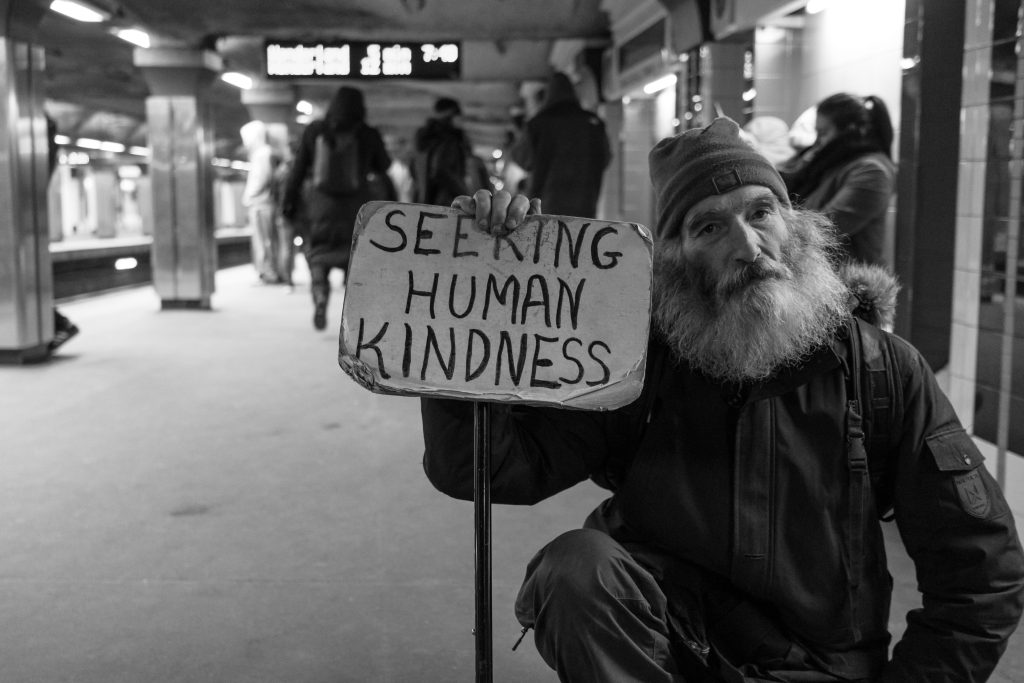As the weather gets nicer here in Michigan City, you are likely to see more homeless people around town as you go about your daily routine. It’s not that homelessness is not an issue for our community year-round—our homeless shelter is full of guests every day of the year. But as the temperatures increase, our homeless population becomes more visible to the community. And with that visibility comes stigma.
Stigma refers to “a mark of disgrace associated with a particular circumstance, quality or person.” It includes negative thoughts and attitudes (and sometimes even discrimination) toward someone based on assumptions about who that person is.
Stigmas only hurt our homeless population, so we want to tackle the topic in today’s blog post. In this article, we will discuss common stigmas and share ideas on fighting back against the stigmas of homelessness.
Common Stigmas of Homelessness
Anti-homelessness stigma is common, not only in our area but in our country and world. According to recent research, which analyzed tweets on the social platform Twitter, the following stigmas about homelessness are prevalent in our society:
- Homeless people are dirty/unhygienic
- Homeless people are socially deviant
- Homeless people are potentially violent or sexual predators
- Homeless people are threatening, violent, and/or engage in criminal behavior
- Homeless people deserve to be homeless
- People are homeless because they are lazy
The results of this study have led authors at Psychology Today to conclude: “…It seems clear that there is some amount of widespread anger directed against homelessness.” As we will discuss, these stigmas, and the anger behind them, are incredibly harmful to our homeless population and our community.
Let no corrupting talk come out of your mouths, but only such as is good for building up, as fits the occasion, that it may give grace to those who hear. (Ephesians 4:29)
The Harm of Stigma
The problem with stereotypes is that they generalize and are often not true for specific individuals. They also don’t help the situation. In fact, the Psychology Today article mentioned above goes on to say:
“Not only does this anger represent a serious social problem, but it also increases the risk of homeless people being targeted for violence or worse. Such widespread anger also makes enacting solutions to help the homeless that much harder to implement.”
Anger can lead to violence. Research by the National Coalition of the Homeless found that between 1999 and 2019, there were 1,852 incidents of violence against homeless individuals. And 515 were fatal.
Anger can also lead to hiding the problem instead of finding a solution. Statistics on 187 urban and rural cities show that 57% have anti-homelessness laws to get people off the streets.
Stigmas also make it harder for homeless people to find the help they need, either because programs to help them don’t exist or because fear of stigma may lead them to keep their housing status secret.
Fighting Back Against the Stigmas of Homelessness
The reality is that the homeless population is as diverse as any other population. While some people struggle with mental health issues and substance abuse disorders, others are fleeing domestic violence or the victim of systemic racism. Homelessness impacts children too. In fact, Indiana’s public schools identified almost 20,000 homeless students in the 2017-2018 school year.
Further, you don’t have to be ‘lazy’ or not working to become homeless. A recent survey from the financial services company Charles Schwab found that 59% of Americans are just one paycheck away from experiencing homelessness. That could be me, you, a neighbor, a friend, or a family member who is that close to experiencing homelessness first-hand.
According to Georgetown Law, the solution starts with rejecting anti-homelessness stigmas: “Rejecting stigmas associated with homelessness enables effective problem-solving.”
We can’t hold negative stigmas about homeless people in our community and effectively solve the problem homelessness. We need open minds. We need people who seek to understand the problem objectively and develop real solutions that work.
How You Can Get Involved
One way to fight back against the stigmas of homelessness is to catch yourself if you start thinking about these stereotypes when you see homeless people in our community during these warm months when they are more visible.
You can also speak up if you hear others promoting these stigmas. Let’s work together to change the narrative about homelessness, and direct our efforts to solving the problem instead of promoting stigmas.
Another idea is to volunteer at the ICPADS homeless shelter, where you’ll meet homeless men and women in our community. This personal experience will quickly demonstrate that stigmas are not helpful and, in many cases, don’t even apply.
Finally, you can do something about the stigmas of homelessness by working to find solutions. A donation to our homeless shelter allows us not only to house guests for the night but also to help them overcome the barriers they need to become self-sufficient. As we posted in our last newsletter, we housed eight guests in March 2022! By supporting our cause with a monetary donation, you can become a part of this vital work that seeks to end homelessness in our community.

Pingback: 12 Fiction Books About Homelessness to Add to Your Summer Reading List – Interfaith Community-PADS
Pingback: Celebrating 1 Year of the ICPADS Blog! – Interfaith Community-PADS